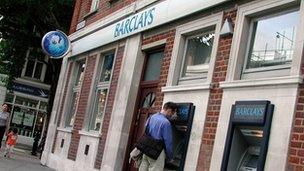Barclays 'fails to win over pay critics'
- Published
- comments

Shareholders will vote on Barclays' remuneration policy at the bank's annual meeting
Big British pension funds and insurance companies are still planning to vote against Barclays' remuneration policy and the re-election of the chair of the remuneration committee, in spite of pay reforms offered yesterday by the bank.
According to well-placed sources, leading institutional shareholders believe that the concessions unexpectedly offered by Barclays do not address their fundamental concern - which is that the bank rewards its top executives disproportionately in relation to the rewards available for shareholders.
"For us it is about Barclays' reliance on investment banking and the connected issue of the huge amount it pays senior investment bankers" said an influential shareholder. "Barclays has not tackled that".
So although one Barclays critic, Standard Life, yesterday said it had been won round, I am told by well-placed sources that between a third and a half of the UK's long-term institutional shareholders - pension funds and insurance companies - will register a protest vote at next week's annual meeting.
This would mean between 15% and 20% of voting shareholders would vote against the re-election of Alison Carnwarth as chair of the remuneration committee and a similar proportion would vote against the remuneration report.
In other words, Barclays would win the motions - but in the teeth of considerable opposition from conventional, long-term British shareholders, who manage the savings of millions of British people. Barclays would be relying on the votes of overseas investors, hedge funds and others investors who do not typically become exercised by remuneration.
"This would be an embarrassment for Barclays" said one manager of a substantial British fund. "Barclays has made it clear it would rather we were on board".
Bonus payments in doubt
Yesterday Barclays announced that half of the deferred bonuses payable to its chief executive, Bob Diamond, and its finance director, Chris Lucas, would only actually be handed to them if the bank succeeds in increasing its return on equity to a level that exceeds the cost of that equity.
What that means is that Barclays has to earn profits from the funds provided to it by shareholders in excess of what it would cost Barclays to raise those funds in current market circumstances. In that sense, return on equity is a fundamental measure of the success of a business: and when a company makes a return below its cost of equity, some would say the business is failing.
Right now Barclays, like many of the western world's big banks, is earning considerably less than its cost of equity. Last year its return on average shareholders' equity was 6.6%, less than half its stated target of reaching 13% by 2013 and considerably below the 11% or so cost of its equity.
But although investors would like to see Barclays improve its return on equity, many of them believe that using it as a target for handing over bonuses is inappropriate, and could even be dangerous.
"We have been telling Barclays that we don't think return on equity is the right target" said a shareholder. "We would like a broader return on assets as the goal".
The reason some investors don't like return on equity as a formal target is that banks can boost it in a very simple but potentially dangerous way, by lending much more relative to their equity - or by "leveraging up" to use the jargon. In other words, when a bank has a formal target of improving the return on equity, it has an incentive to take the kind of dangerous risks that led to the credit crunch and banking crisis of 2007-8.
So in a way, the dispute between Barclays and its leading British institutional shareholders is about something much more fundamental than pay. It is about the structure of Barclays and how it generates its profits.
"Many of us want to see Barclays change its business model in a fundamental sense" said one. "We think it is too dependent on Barclays Capital, and that Barclays Capital's ambition to be one of the world's premier league investment banks is also not the way to go. We want to see Barclays reconstructing itself as a business with more stable, less volatile earnings, and a business which does not have to pay those massive amounts to investment bankers".
This gap between what Barclays' big British shareholders want and the strategy of Barclays' executives poses a serious dilemma for the bank's non-executive directors. This tension will not be resolved quickly or easily.